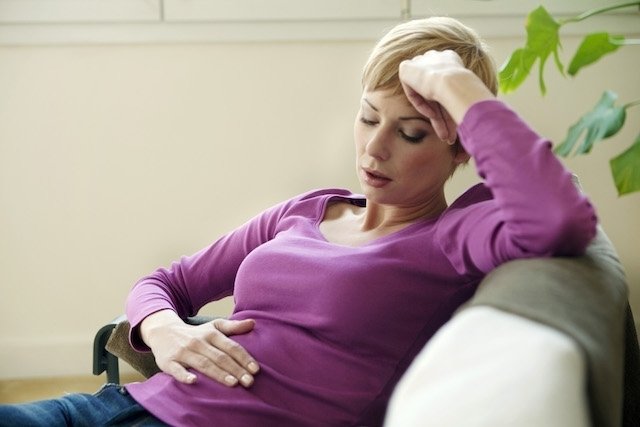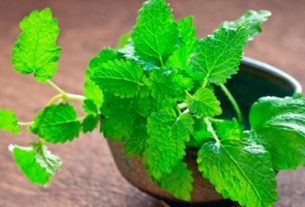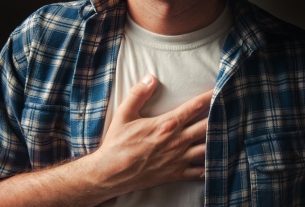Gas is the accumulation of air in the stomach or intestine, which leads to the appearance of symptoms such as a swollen belly, stitches in the stomach, excessive flatulence with or without a bad smell, pain in the chest, abdominal discomfort or constant belching, for example.
These symptoms may appear after consuming carbonated drinks or when swallowing a lot of air, such as when talking while chewing, for example, improving after eliminating the gases. Furthermore, gas can also occur in situations such as irritable bowel syndrome and lactose intolerance. Learn about other causes of gas.
However, in some cases gases are not easily eliminated, especially in people with constipation. In these situations, gas symptoms can be more intense and cause the suspicion of serious problems, such as a heart attack, as they can cause a stitch in the chest area.

Main symptoms
Symptoms that may indicate the presence of intestinal and stomach gas are:
- Stitching or cramping pain in the belly;
- Abdominal swelling;
- hard belly;
- Flatulence with or without smell;
- Sting in the chest;
- Feeling of heaviness in the stomach;
- Frequent burping;
- Loss of appetite;
- Burning in the throat;
- Feeling of shortness of breath.
In addition, intestinal or stomach gas can also cause tummy tremors, due to spasms in the muscles trying to eliminate excess gas. Discover other causes of a shaking belly.
These symptoms can vary in intensity according to each person’s sensitivity and the volume of gases present in the digestive system.
What does gas pain feel like?
Gas pain typically happens when gases are trapped in the digestive system, causing the intestine to dilate. This pain usually appears suddenly, causing a knot, stitch or needle sensation in the belly, which varies from mild to intense.
Pain caused by gas can appear in the middle or under the belly. However, this pain tends to decrease during the elimination of gases, either through intestinal release or in the form of belching.
Main causes
The main causes of intestinal and stomach gas are:
- Use of medications, such as antibiotics and antacids;
- Consumption of foods that are difficult to digest, such as beans, cauliflower and peas;
- air intake when eating, drinking, talking or smiling;
- Constipation or diarrhea;
- Consumption of carbonated drinks, such as soft drinks, sparkling wines and sparkling water;
- Use of sweeteners, such as sorbitol and fructose;
Furthermore, gas can also be caused by situations such as food poisoning, irritable bowel syndrome, celiac disease and gluten or lactose intolerance.
How to eliminate gases
Some tips for eliminating excess gas are:
- Drink a cup of fennel or mint tea after meals. Discover other homemade teas for excess gas;
- Avoid foods that cause gas, such as beans, peas, cauliflower and broccoli;
- Chew food well and slowly;
- Avoid carbonated drinks, such as soft drinks, sparkling wine and sparkling water;
- Avoid excess milk and dairy products and also dishes prepared with milk such as stroganoff, mousse or pudding, for example;
- Practice physical activities at least 3 times a week.
In addition, the doctor may also recommend the use of medicines such as simethicone, activated vegetable charcoal and probiotics, to help eliminate gas. Check out all the remedies recommended for gas.
When to go to the doctor
When excess gas is accompanied by other symptoms, such as diarrhea, vomiting, weight loss and the presence of blood or fat in the stool, it is important to consult a gastroenterologist so that an evaluation can be carried out and the cause of the gas can be identified.
Bibliography
- THE NATIONAL INSTITUTE OF DIABETES AND DIGESTIVE AND KIDNEY DISEASES. Symptoms & Causes of Gas in the Digestive Tract. Disponível em: <https://www.niddk.nih.gov/health-information/digestive-diseases/gas-digestive-tract/symptoms-causes>. Acesso em 15 mar 2019
- PAPADAKIS, Maxine A.; MCPHEE, Stephen J.; RABOW, Michael W. Current Medical Diagnosis & Treatment 2019. 58th. NEW YORK: McGraw-Hill Education, 2019.
- BRAZILIAN SOCIETY OF DIGESTIVE MOTILITY AND NEUROGASTROENTEROLOGY. Intestinal gases. 2019. Available at: <http://www.sbmdn.org.br/gases-intestinais/>. Accessed on November 13, 2019
- MAYO CLINIC. Gas and gas pains. Disponível em: <https://www.mayoclinic.org/diseases-conditions/gas-and-gas-pains/symptoms-causes/syc-20372709>. Acesso em 15 mar 2019

Sign up for our newsletter and stay up to date with exclusive news
that can transform your routine!
Warning: Undefined array key "title" in /home/storelat/public_html/wp-content/plugins/link-whisper-premium/templates/frontend/related-posts.php on line 12
Warning: Undefined array key "title_tag" in /home/storelat/public_html/wp-content/plugins/link-whisper-premium/templates/frontend/related-posts.php on line 13




